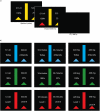Adult age differences in decision making across domains: Increased discounting of social and health-related rewards
- PMID: 27831713
- PMCID: PMC5127408
- DOI: 10.1037/pag0000131
Adult age differences in decision making across domains: Increased discounting of social and health-related rewards
Abstract
Although research on aging and decision making continues to grow, the majority of studies examine decisions made to maximize monetary earnings or points. It is not clear whether these results generalize to other types of rewards. To investigate this, we examined adult age differences in 92 healthy participants aged 22 to 83. Participants completed 9 hypothetical discounting tasks, which included 3 types of discounting factors (time, probability, effort) across 3 reward domains (monetary, social, health). Participants made choices between a smaller magnitude reward with a shorter time delay/higher probability/lower level of physical effort required and a larger magnitude reward with a longer time delay/lower probability/higher level of physical effort required. Older compared with younger individuals were more likely to choose options that involved shorter time delays or higher probabilities of experiencing an interaction with a close social partner or receiving health benefits from a hypothetical drug. These findings suggest that older adults may be more motivated than young adults to obtain social and health rewards immediately and with certainty. (PsycINFO Database Record
(c) 2016 APA, all rights reserved).
Figures


Similar articles
-
Individual Differences in Dopamine Are Associated with Reward Discounting in Clinical Groups But Not in Healthy Adults.J Neurosci. 2019 Jan 9;39(2):321-332. doi: 10.1523/JNEUROSCI.1984-18.2018. Epub 2018 Nov 16. J Neurosci. 2019. PMID: 30446530 Free PMC article.
-
"Adult age differences in decision making across domains: Increased discounting of social and health-related rewards": Correction to Seaman et al. (2016).Psychol Aging. 2018 Sep;33(6):891. doi: 10.1037/pag0000290. Psychol Aging. 2018. PMID: 30198730
-
Subjective value representations during effort, probability and time discounting across adulthood.Soc Cogn Affect Neurosci. 2018 May 1;13(5):449-459. doi: 10.1093/scan/nsy021. Soc Cogn Affect Neurosci. 2018. PMID: 29618082 Free PMC article.
-
Temporal discounting across adulthood: A systematic review and meta-analysis.Psychol Aging. 2022 Feb;37(1):111-124. doi: 10.1037/pag0000634. Psychol Aging. 2022. PMID: 35113618 Free PMC article.
-
No effects of acute stress on monetary delay discounting: A systematic literature review and meta-analysis.Neurobiol Stress. 2024 Jun 3;31:100653. doi: 10.1016/j.ynstr.2024.100653. eCollection 2024 Jul. Neurobiol Stress. 2024. PMID: 38933285 Free PMC article. Review.
Cited by
-
Individual Differences in Dopamine Are Associated with Reward Discounting in Clinical Groups But Not in Healthy Adults.J Neurosci. 2019 Jan 9;39(2):321-332. doi: 10.1523/JNEUROSCI.1984-18.2018. Epub 2018 Nov 16. J Neurosci. 2019. PMID: 30446530 Free PMC article.
-
Age-Related Differences in Motivational Integration and Cognitive Control.Cogn Affect Behav Neurosci. 2019 Jun;19(3):692-714. doi: 10.3758/s13415-019-00713-3. Cogn Affect Behav Neurosci. 2019. PMID: 30980339 Free PMC article.
-
Age-related differences in ventral striatal and default mode network function during reciprocated trust.Neuroimage. 2022 Aug 1;256:119267. doi: 10.1016/j.neuroimage.2022.119267. Epub 2022 Apr 30. Neuroimage. 2022. PMID: 35504565 Free PMC article.
-
A stronger relationship between reward responsivity and trustworthiness evaluations emerges in healthy aging.Neuropsychol Dev Cogn B Aging Neuropsychol Cogn. 2021 Sep;28(5):669-686. doi: 10.1080/13825585.2020.1809630. Epub 2020 Aug 20. Neuropsychol Dev Cogn B Aging Neuropsychol Cogn. 2021. PMID: 32815772 Free PMC article.
-
The Effect of Delay Duration on Delay Discounting Across Adulthood.J Gerontol B Psychol Sci Soc Sci. 2022 Mar 3;77(3):467-471. doi: 10.1093/geronb/gbab198. J Gerontol B Psychol Sci Soc Sci. 2022. PMID: 34687307 Free PMC article.
References
-
- Brown SBRE, Ridderinkhof KR. Aging and the neuroeconomics of decision making: A review. Cognitive, Affective, & Behavioral Neuroscience. 2009;9:365–379. doi:10.3758/CABN.9.4.365. - PubMed
MeSH terms
Grants and funding
LinkOut - more resources
Full Text Sources
Other Literature Sources
Medical

